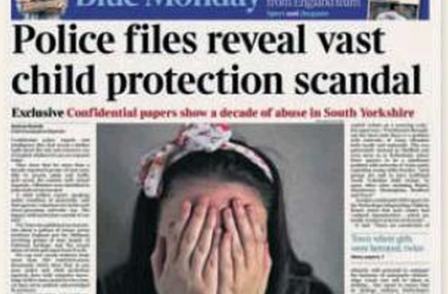
An independent report prompted by the journalism of The Times yesterday revealed that at least 1,400 children were abused the hands of mainly men of Pakistani origin over a 15-year period in Rotherham.
The head of Rotherham Council has resigned following publication of the report by professor Alexis Jay and South Yorkshire Police and Crime Commissioner Shaun Wright (a former head of children’s services for the council) was today also under pressure to resign.
The spotlight first fell on Rotherham in 2010 when five men were given lengthy jail terms after they were found guilty of grooming teenage girls for sex.
The prosecution was the first of a series of high-profile cases in the last four years that have revealed the exploitation of young girls in towns and cities including Rochdale, Derby and Oxford.
Following the 2010 case, The Times claimed that details from 200 restricted-access documents showed how police and child protection agencies in the town had extensive knowledge of these activities for a decade, yet a string of offences went unprosecuted.
The Jay report – commissioned by the council – said failures of the political and officer leadership of Rotherham Council between 1997 and 2009 were "blatant" as the seriousness of the problem was underplayed by senior managers and was not seen as a priority by South Yorkshire Police.
It emerged yesterday that no council employees will face disciplinary action
Jay said there was a “widespread perception” among frontline council workers “that some senior people in the council and the police wanted to play down the ethnic dimension” to the attacks.
Professor Jay, who is a former senior social worker, said: “I was told that some elected members seemed to be in denial about the issue and refused to believe that such a thing could happen in Rotherham.”
 Times journalist Andrew Norfolk has been investigating the issue of child-sex grooming since January 2011.
Times journalist Andrew Norfolk has been investigating the issue of child-sex grooming since January 2011.
Writing in the paper today, Norfolk said: "As recently as 2012, those holding the reins of power at the council were continuing the decade-long exercise in refusing fully to acknowledge and learn from disastrous past mistakes.
“When a serious case review was ordered into the 2010 murder of Laura Wilson, 17, the council’s safeguarding children board tried to withhold it from publication. The board, ordered to publish by the government, produced a report with heavy redactions that concealed information about the ethnicity of adults who had been suspected of grooming her for sex from the age of 11. It also hid details of care professionals’ involvement with the girl from the age of 11 to 15.
“When the council discovered that The Times intended to publish information about care workers’ knowledge of Laura’s involvement with 'Asian men', it sought at great expense a High Court injunction barring publication.
“It dropped the legal action in June 2012 after Michael Gove, the education secretary at the time, accused the board of withholding 'relevant and important material'. Three months later, this newspaper revealed the extent of Rotherham’s failure to protect exploited children. The council’s response was to ask the police, and then a firm of solicitors, to investigate the leak of restricted information.
“Last August, The Times published information about a 15-year-old Rotherham girl, in the care of social services, who was allowed extensive daily contact with a violent offender suspected of grooming more than a dozen young teenagers for sex.
“A few days after the article’s publication, the council ordered an independent inquiry. It should not have taken more than a decade. More girls suffered as the council obfuscated. Future councils, tempted to chase leaks rather than act on their failings, must take heed.”
Jay said in her report that the redactions to the Serious Case Review report into the murder of Laura Wilson were unnecessary but did not amount to a cover up.
She said:
The selection of redactions is a matter of judgement. In alleging a 'cover-up’, the Times newspaper cited a small number of redactions where reference to officials was made. In each case we found that either the redaction was unnecessary, or the event in question had limited significance to the thrust of the report, or the reference to officials could have been retained with dexterous editing of the paragraph in question. We do not believe, however, that a charge of cover-up by the author or the Safeguarding Board can be justified.”
Email pged@pressgazette.co.uk to point out mistakes, provide story tips or send in a letter for publication on our "Letters Page" blog
